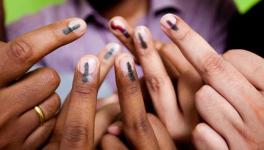SC Cancels ICDS Tenders Worth Rs 6,300 Crore in Maharashtra, Victory For Anganwadi Workers
In response to a petition by 36 women’s groups from Maharashtra, the Supreme Court has has struck down tenders worth Rs 6,300 crore issued by the state government in 2016 for the production and supply of take-home rations under the Centre’s Integrated Child Development Scheme (ICDS). The decision came on 26 February 2019, after a long battle waged by the Anganwadi workers’ groups against the Devendra Fadnavis-led BJP government’s decisions to dole out tenders to big private companies — instead of empowering self-help groups being run by women.
The women groups in their petition had stated that the terms of the tenders were being arbitrarily fixed and the conditions put on them made it difficult for small-scale groups to participate in the scheme.
Speaking to Newsclick, AR Sindhu of the All India Federation of Anganwadi Workers and Helpers (AIWFAH) said, “Across multiple instances, such as the chikki scam, in which yet again women and child development minister Pankaja Munde was involved, just like in this case, it becomes evident that there is a clear nexus between administration, ruling party and bureaucracy to make a systematic effort to keep the smaller organisations of women out of the scheme, to benefit their own people and the corporates.”
Read more: “Betrayal of Promises Made to Anganwadi Workers Will Cost Modi 2019”
“Another example of this is the bonhomie between Narendra Modi and the Akshay Patra foundation, there are benami organisations that get floated so that the tenders come back to the corporates.”
Pointing towards the attempts to privatise the ICDS, she added, “This pattern can be seen across the BJP-ruled states, the problem is particularly acute in Uttar Pradesh and Madhya Pradesh. There is a corporate fraud being done with the involvement of multinationals the brunt of which is being borne by women who are trying to sustain themselves.”
The ICDS caters to children under 6 years of age and their mothers — providing food, preschool education, primary healthcare, immunization, health check-up and referral services.
The Supreme Court has been consistently stating that the point of the scheme has been to empower self-help groups to get involved in the process and towards the decentralisation of power, encouraging no profit-making. Until 2014, the tenders were being given to the Self Help Groups (SHGs), for packaged food and take-home ration. The groups were required to be at least 2 years old, with a profit of up to Rs 3 lakh. However, in 2016, new tenders were floated wherein the supplier had to have an annual turnover worth at least 25 per cent of the whole block’s purchases of take-home rations, which amounted to a turnover of Rs 1 crore to Rs 7 crore per year. Moreover, the new tender made expensive extrusion technology mandatory for the food processing in the supply of take-home ration.
Read more: Anganwadi Workers Angry With Budget
In 2016, when the case was taken to court, the Aurangabad bench of the High Court had scrapped the Rs 6,300-crore tenders. However, it upheld the strict terms and conditions in the tender that made automated machinery and extrusion technology mandatory for suppliers of take-home ration. Following this, the case was taken to the Supreme Court.
The court has now ordered the Maharashtra government to stop the supply of ICDS ration under the current system, issue fresh tenders within four weeks, and design an alternate system of ration-supply for the interim period. The imposition of extrusion technology now stands diluted. The Court also pointed out that the central government’s guidelines for the ICDS do not, in fact, make any sophisticated technology mandatory, and that “self-help groups/mahila mandals are fully equipped and competent” to make and supply take-home ration.
Get the latest reports & analysis with people's perspective on Protests, movements & deep analytical videos, discussions of the current affairs in your Telegram app. Subscribe to NewsClick's Telegram channel & get Real-Time updates on stories, as they get published on our website.
























